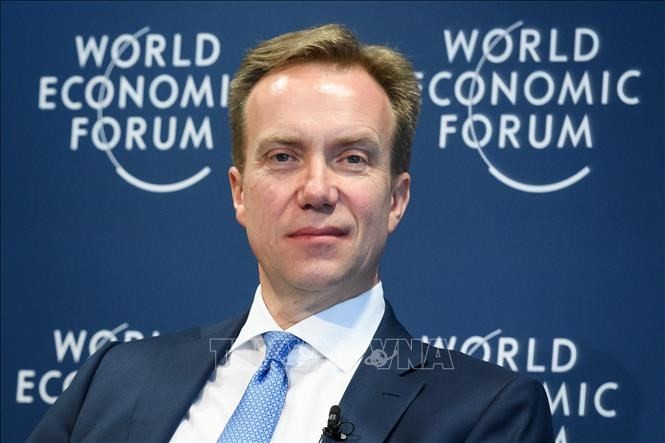(VOVWORLD) -As geopolitical and economic instability continues to escalate, the ongoing World Economic Forum is an opportunity for the global community to turn the desire to rebuild trust into concrete actions.
 The 54th World Economic Forum takes place in Davos, Switzerland, from January 15-19. (Photo: WEF) The 54th World Economic Forum takes place in Davos, Switzerland, from January 15-19. (Photo: WEF) |
The 54th annual meeting of the World Economic Forum (WEF-54) themed "Rebuilding trust" opened on Monday in Davos, Switzerland.
Four key topics
Prior to opening day, organizers released a "Global Risk Report" which says artificial intelligence (AI) and its effect on the integrity of information will become the biggest threat to the world in the next few years, followed by extreme weather and forced migration. The emergence of these non-traditional threats, added to traditional risks such as armed conflicts and economic inequality, is creating an increasingly complex and fragile world.
 WEF President Borge Brende (photo: VNA) WEF President Borge Brende (photo: VNA) |
WEF President Borge Brende stressed the urgent need to rebuild trust. "It’s taking place against the most complicated political and geo-economic backdrop in decades. We urgently need to rebuild trust. This is the theme of the meeting,” he said.
According to the WEF, trust needs to be rebuilt in three areas: trust in our future, trust in society, and trust between nations. This year's WEF meeting will be the biggest since the COVID-19 pandemic, as it is involving more than 2,600 participants, including leaders of 70 countries and representatives of royal families and international organizations.
The effort to rebuild trust and find solutions to global issues will move in four directions: increasing security and cooperation in a fractured world, creating growth and jobs for a new era, harnessing artificial intelligence to improve the economy and society, and devising a long-term strategy for climate, nature, and energy.
It is hoped that the participation of UN Secretary-General Antonio Guterres, Chinese Premier Li Qiang, French President Emmanuel Macron, European Commission President Ursula von der Leyen, and other major world leaders will heighten the effectiveness of the Forum.
Amitabh Behar, interim CEO of Oxfam, a non-governmental organization which just released a report on the world’s growing inequality, says the Davos forum is a place where warnings about inequality will be listened to seriously.
“The WEF is a very important platform where we are able to get the richest people, political leaders, and the heads of corporations. We do need to have fundamental conversations here," Behar said.
Seeking solutions to disputes
The Davos forum is an opportunity to discuss the challenges facing the world’s economy and governance, as well as current conflicts around the world.
One day before the opening, the 4th meeting of National Security Advisors was held in Davos, where representatives from 83 countries discussed a Ukrainian "peace formula". Swiss Foreign Minister Ignazio Cassis said the number of participants shows that most countries want to rebuild trust and end the conflict in Ukraine that will enter its third year on February 24.
In contrast to many Western governments’ tough stance towards Russia, the Swiss Foreign Minister said there will be no lasting peace without Russia's voice, so the international community must facilitate talks between the opposing parties.
“One way or another, we should find a way to bring Russia into the peace discussions. There will be no peace if Russia cannot have its say. It will be worse if Russia does nothing and then we just ignore everything and wait. What is the alternative? Wait. We don't have the right to wait," said Cassis.
Other crises, including the conflict in Gaza and tensions in the Sea Red, will be discussed by representatives of 30 UN agencies and the heads of state and foreign ministers of many Middle East countries, including the Israeli President, Qatar’s Prime Minister, and the Prime Minister of Lebanon.